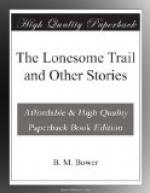“At dances,” he mused aloud, “one doesn’t consider men as individuals—it’s merely a question of feet. She took me for a train robber; and I danced with her about forty times, that night, and took her over to supper and we whacked up on our chicken salad because there was only one dish for the two of us—oh, mamma!”
He pulled off the saddle with a preoccupied air and rubbed Glory down mechanically. After that he went over and sat down on the oats’ box and smoked two cigarettes while he pondered many things.
He stood up and thoughtfully surveyed himself, brushed sundry bright sorrel hairs from his coat sleeves, stooped and tried to pinch creases into the knees of his trousers, which showed symptoms of “bagging.” He took off his hat and polished it with his sleeve he had just brushed so carefully, pinched four big dimples in the crown, turned it around three times for critical inspection, placed it upon his head at a studiously unstudied angle, felt anxiously at his neck-gear and slapped Glory affectionately upon the rump—and came near getting kicked into eternity. Then he swung off up the path, softly whistling “In the good, old summer-time.” An old hen, hovering her chicks in the shade of the hay-rack, eyed him distrustfully and cried “k-r-r-r-r” in a shocked tone that sent her chickens burrowing deeper under her feathers.
Miss Satterly had changed her pink kimono for a white shirt-waist and had fluffed her hair into a smooth coil on the top of her head. Weary thought she looked very nice. She could make excellent lemonade, he discovered, and she proved herself altogether different from what the messages she sent him had led him to expect. Weary wondered, until he became too interested to think about it.
Presently, without quite knowing how it came about, he was telling her all about the race. Miss Satterly helped him reckon his winnings—which was not easy to do, since he had been offered all sorts of odds and had accepted them all with a recklessness that was appalling. While her dark head was bent above the piece of paper, and her pencil was setting down figures with precise little jabs, he watched her. He quite forgot the messages he had received from her through the medium of the Happy Family, and he quite forgot that women could hurt a man.
“Mr. Davidson,” she announced severely, when the figures had all been dabbed upon the paper, “You ought to have lost. It would be a lesson to you. I haven’t quite figured all your winnings, these six-to-ones and ten-to-ones and—and all that, take time to unravel. But you, yourself, stood to lose just three hundred and sixty-five dollars. Gee! but you cowboys are reckless.”
There was more that she said, but Weary did not mind. He had discovered that he liked to look at the schoolma’am. After that, nothing else was of much importance. He began to wish he might prolong his opportunity for looking.




